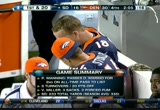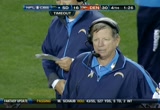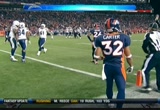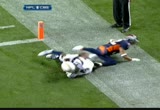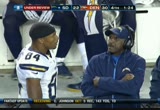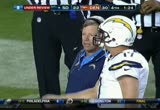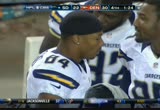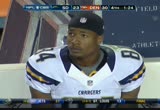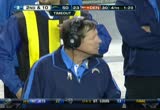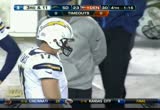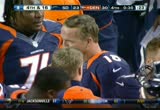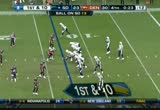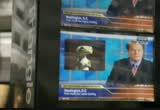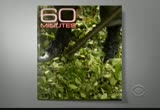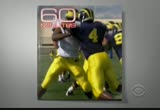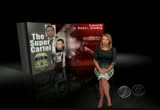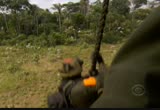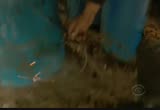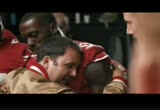tv 60 Minutes CBS November 18, 2012 7:30pm-8:30pm EST
7:30 pm
are some of the numbers today. we've had five turnovers. von miller may be the best defensive player in the nflll after j.j. watt down in houston. solomon: philip rivers has three turnovers because he has been hit and harassed. kevin: ronnie brown. -- brown. miller brings him down. gain of five to the 35. we've reach it would two-minute we've reach it would two-minute warning.
7:31 pm
i can't see. ooh, turn up the brightness. it's already up. oh, oh, ooh! sorrry buddy, you know, some of us destroy zombies and some of us feed em. how am i suppose to win? your screen is like as big as my phone. not everything's about winning. i like to win. you like to whine. you do. vo: the bigger, brighter super amoled screen on the new samsung galaxy s3. [ zombies growling ] ♪ [ explosion ] ♪ [ breathing heavily ] call of duty: black ops ii? oh. thought someone was... yeah, forget it. ♪ [ male announcer ] rated "m" for mature. be game ready. get call of duty: black ops ii for xbox 360 at walmart.
7:32 pm
kevin: tonight on cbs begins with "60 minutes" and a report on america's top college football programs, followed by new episodes of "the amazing race" "the good wife" and "the mentalist." only cbs. we have the two-minute warning. broncos going for their seventh win of the season. chargers with a second down and 15. the broncos have scored 13 points off three san diego turnovers.
7:33 pm
false start. referee: false start, number 79 offense. five-yard penalty. second down. solomon: for the first time in 16 games, the broncos didn't score any points in the first quarter but in the second quarter, demaryius thomas catches the first of manning's three touchdown passes. manning, touchdown strike 31 yards to stokley. a strike to eric decker. three touchdown passes for peyton manning. they score 30 points for the fifth consecutive game, the most in the national football league. this offense and defense is red-hot in denver. kevin: six defensive backs. second down and 20. alexander with the catch. the tackle by bailey. the gain to the 22. he picks it 18 only second and 20. solomon: rivers is still fighting.
7:34 pm
someone grabs his hands as he gets ready to throw the ball. he gets hit but still stands in the pocket and delivers a strike to alexander. very impressive throw. kevin: first and 10, ronnie brown. hit by wolfe and down he goes. it's third down and 2. they got maybe a yard. referee: first charged time-out, san diego. a 30-second time-out. kevin: on this drive, which started back at the charger 20. an 11-yard pass to alexander, an 1-yard pass to alexander. and a 24-yard catch and run by mathews out of the backfield. solomon: rivers only has one touchdown pass in this game. eight-yard strike in the corner of the end zone to danario alexander. remember, he's matched up against the 5'9" carter. will the broncos give him that
7:35 pm
same look? will he go to a malcolm floyd against carter or stick with alexander? he wants the favorable match-up to win the jump ball opportunity. carter is at the bottom of the screen against alexander. kevin: on fourth and 1. rivers. what a catch by alexander! that is a touchdown. carter was beaten. solomon: it's the matchup they wanted. remember, carter came into today's game only allowing opposing quarterbacks to complete 27% of their passes, by far the best of any cornerback in the national football league. but when you're going up against someone as tall as alexander and you're 5'9", very difficult to keep him out of the end zone. i thought if carter was playing him off he might have had a
7:36 pm
chance. but as soon as i saw him in a bump and run situation, you knew rivers was going to take a shot. kevin: of course, every scoring play is reviewed. referee: the ruling on the field is a touchdown. the previous play is under review. solomon: they want to know did he hold on to the ball? did he complete the catch. take a look. remember, in the nfl, you have to catch and it hold on to the ball throughout the catch. does this ball move? oh, they're going to take this one back, kevin. unfortunately for him, they're going to take it back. that ball moved. once it hits the ground and it jossles and moves, it dislodges from his possession. that's why they're going to call it an incompleted pass. knee down, ball there. but remember the calvin johnson play a couple of years ago in the end zone. even though the ball touched down in the end zone you have to maintain full, complete possession of the ball through
7:37 pm
the catch and through contact and collision with the ground. that's the rule. kevin: through the catch is the keyword. solomon: through the catch, through the collision with the ground and that's the key. right now in the pass right now that would have been a touchdown. but they changed the resume. it says the ball can touch the ground as long as it doesn't move, rotate or jostle law schools and clearly there was movement on the ball after it touched the ground. charlie joiner, hall of fame wide receiver who coaches for the chargers is coaching him up on that very point right now. but great play by alexander. kevin: here's a kid they signed off the street a month ago. they'd been trying to find some replacement for the lost free agent vincent jackson who went for big money to tampa bay. solomon: he senses this one is going to come back. you can see the disappointment on his face. i think the chargers would be
7:38 pm
sproysed if this is not overturned. it was ruled a touchdown on the field of play. it's a fourth-down play. so if it doesn't stand, the ball will go to the denver broncos and the game is basically over. that's how big this play is. it's under review. it was ruled a touchdown in the field of playoff. kevin: the chargers came in having lost two of their last three. but rivers and this charger team had won three consecutive games here in denver. they had won five of the last six. the difference is there was no number 18 for the broncos at that particular time. solomon: it's as if the negative energy and momentum continues for the chargers. since that week six contest, we've talked about it some. let's see what they call it.
7:39 pm
referee: after review, the ruling on the field is confirmed. the receiver had possession of the ball and set the ball out across the goal line, therefore ending the process of the catch. it is a touchdown. solomon: so they're saying that when he stuck the ball over the goal line, right here, there's saying that's a touchdown right there. kevin: because he caught the ball. solomon: he had caught the ball and made a football act. he caught it, turned around, and stuck the ball out. kevin: they tack on one more and we have a seven-point game with 1:24 to play here in denver. solomon: wow. you could see it even on the face of many of the san diego chargers. they weren't so sure that that catch would be upheld. look at the standings and this is what's on the line with that catch by alexander.
7:40 pm
now down by seven points with 1:24 to go. kevin: so a loss would in effect put the chargers four games in back of denver in the a.f.c. west because the broncos would hold the tie breaker between the two. solomon: how big has alexander been in the couple of weeks they've had him on the team? he wasn't in training camp with the san diego chargers. but he's a former high pick for the st. louis rams. you mentioned the injuries he's had. the talent has never been in question. the durability has. kevin: seven catches this afternoon for 96 yards and two touchdowns. they began the second half with an onside kick and programs try the same thing again here. solomon: a successful onside kick to begin the second half. kevin: novak with the kick. time-out, denver.
7:41 pm
roy second charged time-out, denver. a 30-second time-out. correction. third and final charged time-out, denver. kevin: they're out of time-outs. john fox, who has, over the last two years -- we talked about this earlier in the broadcast, handled two pretty interesting quarterback situations. tebow mania a season ago. manning coming in and he said when we got manning he was still regenerating the nerves in his neck. it was that getting used to our young receivers and our offense changed from a running offense to a passing offense. solomon: wonderful things happened with peyton manning. we talked to him about that peyton manning passing academy. you have to wonder if brock
7:42 pm
osweiler was attending those. the players who have come out of there, i think has improve it would level of play at the quarterback position with a lot of great flares. look at the onside kick. kevin: they've had one successful onside kick today. trying it again. grabbed by denver. wrapped up and grabbed by tight end virgil green. so the broncos are out of time-outs. san diego has two. manning takes over first and 10. solomon: you'll see norv turner burn those time-outs immediately. but first he's got to stop the play. if you're the broncos you have to run it and if you're the chargers, you have to know they're going to run it. you're not going to put the ball in the airplane and miss an incompletion or an interception. you're on the field to kill clock and the chargers have to be able to stuff the run and
7:43 pm
then immediately call a time-out. kevin: first down and 10 with a block from vazquez. good tackle. there is no gain on the play and a time-out. referee: second charged time-out, san diego. a 30-second time-out. solomon: they only lose four second on the clock. good play, good stop. good execution by using the time-out quickly. now they want to do that again. if you're denver, yeah, you're going to run the ball. it's hard to do that when you know the chargers understand your intent on second and 10 but you have to try to get some movement, you have to try to get that ball to the second level. if you can pick up a first down, essentially it would be game over. kevin: second down and 10.
7:44 pm
baledles, a block. thrown for a one-yard loss. another san diego time-out. the broncos will be back at the 50. solomon: so they burn their final time-out. they lose only eight seconds in two plays. now they're out of time-outs and i think if you're denver, you go ahead and run it again. and now you'll be able to bleed even more time off the clock if you stay inbounds, because the chargers are out of time-outs. so the chargers will get the ball back, even after the punt, with under a minute left to play. if they get the stop here on third down.
7:45 pm
kevin: same basic personnel. third down and 11. stuffed again. this time jarrett johnson, the ex-raven with the stop. no gain at the 50. both teams are out of time-outs. so denver will take their sweet time. solomon: they'll look to punt it here. kevin: manning today, 270 yards, three touchdowns. one interception. leading pro bowl vote getter so far and coming into this weekend was the number one rated passer in the nfl. they can run the clock down to about 30, 31 seconds before colquitt would have to punt. and manning, by the way, just
7:46 pm
to tie up some lose ends, one more touchdown -- loose ends, one more touchdown pass coming into today was all he needed to pass dan marino for all time lead. not only that he tacked on two more. referee: please put 30 seconds on the game clock. kevin: and if denver goes on to win, he'll be at 148 in regular season wins. that would tie number two with john elway. solomon: the records are falling. as long as peyton manning keeps playing. kevin: fair catch back at about the 13-yard line. 42-yard punt. no time-outs and 23 seconds.
7:47 pm
rivers will strap it on. solomon: i think they're going to take some shots, try to get downfield and get the match-ups that we talked about. look at the length of field they need to cover to be able to tie this game at 30-30. kevin: that is a long way to go. carter and leonhard. adams. they have brutal than there. champ bailey. rahim moore. -- seven defensive backs. first and 10. for the tight end green. bailey was making sure he didn't get much more than four yards. solomon: hasn't there been a tremendous improvement in terms
7:48 pm
of protection for philip rivers the last few minutes? kevin: you're right. solomon: maybe they've been more help to clary against von miller. kevin: second and 6. here comes the rush, dumervil! there's a fumble. down he went. the clock continues to go. it is the fourth sack by the broncos and that is all she wrote and the denver broncos have won it. manning, three touchdown passes. they win it 30-23. their lead now is three games and they have a tie breaker against seventh-place san diego. -- second-place san diego. tonight on cbs, "60 minutes," followed by new episodes of the amazing race, "the good wife" and the mentalist.
7:49 pm
7:50 pm
7:53 pm
captioning funded by cbs and ford-- built for the road ahead. >> logan: we're about to take you behind the scenes of a three-year investigation that took down the super-cartel, the most powerful drug trafficking and money laundering organization law enforcement agents say they've ever seen. >> there it is. holy ( bleep ). >> logan: given unprecedented access, our "60 minutes" team was sworn to secrecy... until tonight. >> stahl: babies don't do much, right? well, years of research on infants as young as three months is proving that notion wrong. >> up goes the curtain. >> stahl: here at the yale infant cognition center, psychologists are observing everything from altruism to selfishness, bigotry to kindness.
7:54 pm
>> what seems to be an ignorant and unknowing baby is actually a creature with this alarming sophistication. >> keteyian: what are the stakes in college football today? the michigan wolverines will tell you they're not just student athletes. that football is a full-time job. here, they were training with the navy seals last may, four months before their season began. at virtually every big program in the country, the money college football generates supports all the other sports on campus. >> what the hell are we waiting for? let's go. >> keteyian: the competition is fierce to stay on top and on tv. ( cheers and applause ) >> i'm steve kroft. >> i'm leslie stahl. >> i'm morley safer. >> i'm bob simon. >> i'm lara logan. >> i'm scott pelley. those stories tonight on "60 minutes." [ male announcer ] you're not the type of person who sets goals
7:55 pm
and only hopes to achieve them. so you'll be happy to know that when it comes to your investment goals, northern trust uses award-winning expertise to lead you through an interactive investment process. adding precision to your portfolio construction by directly matching your assets and your risk preferences against your unique life goals. we call it goals driven investing. your life has a sense of purpose. shouldn't your investments? ♪ expertise matters. find it at northern trust. ♪ it's part of what you slove about her.essing. but your erectile dysfunction - you know, that could be a question of blood flow. cialis tadalafil for daily use helps you be ready anytime the moment's right. you can be more confident in your ability to be ready. and the same cialis is the only daily ed tablet approved to treat ed and symptoms of bph, like needing to go frequently or urgently.
7:56 pm
tell your doctor about all your medical conditions and medications, and ask if your heart is healthy enough for sexual activity. do not take cialis if you take nitrates for chest pain, as this may cause an unsafe drop in blood pressure. do not drink alcohol in excess with cialis. side effects may include headache, upset stomach, delayed backache or muscle ache. to avoid long-term injury, seek immediate medical help for an erection lasting more than four hours. if you have any sudden decrease or loss in hearing or vision, or if you have any allergic reactions such as rash, hives, swelling of the lips, tongue or throat, or difficulty breathing or swallowing, stop taking cialis and get medical help right away. ask your doctor about cialis for daily use and a 30-tablet free trial. who in their right mind lines up at midnight to get the best deals on all the latest technology. turns out, bruce does. bruce: woo! yea! black friday! vo: come in on black friday at midnight this thanksgiving to find the perfect gift. like a toshiba 40" tv for only $179.99.
7:57 pm
or a lenovo laptop for $187.99. the hottest prices, and amazing deals. only at best buy. from tests like this. ♪ and even more from real families who use them like this. we think there's another test to consider. it's based on one simple question. after living with your van, would you buy it again? more town & country owners do than the owners of any other minivan. it's called the test of ownership, and to us, it's the most important test there is. of washington about the future of medicare and social security. anncr: but you deserve straight talk about the options on the... table and what they mean for you and your family. ancr: aarp is cutting through all the political spin. because for our 37 million members, only one word counts.
7:58 pm
get the facts at earnedasay.org. let's keep medicare... and social security strong for generations to come. >> logan: we're about to take you behind the scenes of a three-year investigation that took down the most powerful drug trafficking organization in law enforcement history. bigger than both the cali and the medellin cartels combined, more powerful than the infamous pablo escobar, this was a colombian cocaine empire with a reach so vast and profits so great it became known as "the super cartel." sworn to secrecy until now, our "60 minutes" team was given unprecedented access to the investigation as it was unfolding.
7:59 pm
colombian national police worked alongside agents from ice, the u.s. immigration and customs enforcement agency, whose job, among other things, is to prevent contraband from moving across u.s. borders. the amount of cocaine and money the super cartel smuggled was incomprehensible, and it took authorities by surprise. u.s. ice agents first got a glimpse of what they were up against when they arrived here in september 2009, the sprawling pacific coast port of buenaventura, colombia. the agents got a tip to be on the lookout for cargo containers of fertilizer arriving from mexico. they were stunned by what they found. >> there it is! >> holy ( bleep ). >> logan: shrink-wrapped bundles of money. this one is $700,000 u.s. in $20 bills. as they searched through more
8:00 pm
containers, both here and in mexico, they found staggering amounts of cash. more and more money, $41 million in that first seizure alone. you'd never actually seen anything like it? >> luis sierra: no, we'd never seen containers full of cash. >> logan: luis sierra was directing the ice operation that day. he told us that, until then, tales of containers full of cash were just a myth. >> logan: how much space physically does that kind of money take up? >> sierra: $41 million is... is probably waist-deep in maritime shipping container, waist-deep of cash. >> logan: how long did it take you to count it? >> sierra: it took us 30 days to count. >> logan: teams of agents worked eight hours a day with colombian police counting the money inside this heavily secured bank in the capital, bogota. and that was just the beginning. >> sierra: the amounts of cash
8:01 pm
they move is unfathomable. it... we couldn't believe it. and shipments that we seized, that was a routine shipment for them. that was... that was nothing. >> logan: a routine shipment. >> sierra: routine. monthly, weekly-- that wasn't a once-a-year or a one-time shot. they were... that was standard business. >> logan: how much money are you talking about? >> sierra: hundreds of millions, if not billions. >> logan: of dollars? >> sierra: of dollars being smuggled around the world into colombia. >> logan: these shipments were just one method of smuggling cash. they also hid money in vehicles, luggage and furniture. >> sierra: we've never seen the likes of it, you know, an organization operating on that scale. >> logan: explain to me how this cartel would work. is it fair to say it was like a conglomerate? >> sierra: it was run like a sophisticated business, a fortune 500 company. they had... they had their c.e.o.s, they had their vice presidents.
8:02 pm
>> logan: was it very compartmentalized? >> sierra: yeah, they've learned. and this particular cartel, you could be involved in transportation, but you didn't know who the c.e.o.s were or even whose cocaine you were smuggling. so no one really knew what the other hand was doing except for two or three people at the top. >> logan: the enormous scale of the cartel's operations was unprecedented, and so was the audacious plan u.s. ice agents and colombian police used to bring the men at the top to justice. they did it by following the money, starting with the cash from that first seizure three years ago. it led them to a trio of ruthless kingpins who ruled the super cartel for a decade. luis caicedo was the mastermind, a former police investigator so secretive he was known as "the ghost." julio lozano directed the group's powerful alliance with mexican cartels. and claudio silva managed the
8:03 pm
cartel's assets, worth billions of dollars. ice agents told us the super cartel supplied 42% of colombian cocaine in the u.s., some 900 tons over seven years, much of it grown here in the verdant coca fields that blanket central colombia. we went with colombian police commandos, called "junglas," and u.s. ice agents on a series of raids to destroy drug labs linked to the super cartel. across streams, through dense vegetation, the junglas led us toward a crude structure hidden beneath the jungle canopy. in colombia, steve kleppe is the u.s. immigration and customs enforcement agent in charge. how important is a lab like this to the cartel? >> steve kleppe: it's tremendously important. in the supply chain, this is step one. and you'll find these type of
8:04 pm
clandestine labs closest to the coca fields themselves. >> logan: the piles of coca leaves you see here are the source of the cartel's vast fortune. inside these big barrels, the leaves are soaked with gasoline and toxic chemicals to make unrefined cocaine. there are thousands of labs like this across colombia. they're easy to build and easy to conceal. the commandos set a series of explosive charges throughout the makeshift structure, and directed us to a nearby coca field where we watched the jungle lab go up in smoke. it's a tiny but critical part of the super cartel's global enterprise. 200 miles to the north, the cartel bosses ran their daily operations from a string of small cafes and coffee shops in an upscale neighborhood in bogota. that's where luis sierra and other ice agents shadowed them
8:05 pm
for months. how difficult was it to run surveillance on this cartel? >> sierra: i'd say this was the most difficult surveillance that we've ever seen. these guys were so anonymous, they were like ghosts. trying to identify them during the surveillance was extremely difficult. >> logan: in face-to-face meetings at the cafes, the bosses issued orders to their lieutenants. >> sierra: these guys essentially existed off the radar, people who didn't lead typical... what we think of as typical drug trafficker, money launderer lifestyles. very low profile, low key. driving anonymous cars, living in small apartments. it was amazing that they lived this lifestyle, and that made it harder for us to identify them. >> logan: so what's the point of having all the money, then, if you can't use it? >> sierra: yeah, i remember asking one of the members of the cartel that question, because we couldn't figure it out.
8:06 pm
and the answer that person gave us was, for the power. >> logan: it all began to unravel when this ice agent turned one of the cartel's most trusted money men into his secret informant. the agent was only allowed to talk to us if we concealed his identity, because he still works undercover. what would happen to you if your cover was blown? >> agent: they'll probably retaliate. >> logan: and retaliation would probably mean what? >> agent: maybe just a hit on your life or, you know, family. you never know. >> logan: can you describe the... the kind of guys that you were dealing with? >> agent: they were well- educated, well-dressed, well- spoken. you'd be surprised how young these guys are. some of them even had a master's degrees. so they operated legitimate businesses, and, on the side, they were drug traffickers. and, you know, even their families didn't know what they did. you'd never think if you saw them out on the street that they were drug traffickers.
8:07 pm
>> logan: were they feared? >> agent: yes. they... they were feared just because they had so much money, so much power that, you know, people didn't want to mess with them. >> logan: in a daring ploy, the undercover ice agent infiltrated the top tier of the cartel in colombia. >> agent: they thought i was just a money guy who, you know, was facilitating the money pickup for the organization. so they thought i was a member. >> logan: for months, the u.s. agent helped direct the super cartel's cash and cocaine deliveries right into the hands of police and his fellow agents in more than a dozen countries around the world, from ecuador to morocco to the netherlands. in one operation, this semi- submersible built by the super cartel was intercepted near the galapagos islands. it was carrying a ton and a half of cocaine. in another, this suitcase stuffed with their cash was picked up in spain by an undercover ice agent. meanwhile, back in colombia, authorities wiretapped the phones of the bosses' friends, wives and mistresses.
8:08 pm
the ice agents and police methodically began cutting off the cartel's main tentacles. >> agent: we started with the boss, and, from there on, we just went down. and we actually dismantled the whole organization from the suppliers to, you know, to the people who picked up the money, who did the payoffs, you know, to the people who actually transported the narcotics to the people who received the narcotics. >> logan: the first of the bosses to fall was luis caicedo, the ghost. he had fled from colombia to what he thought was safety in argentina. ice agent steve kleppe was there when police moved in. >> kleppe: his look at the time of arrest was just of shock. >> logan: did you look into his eyes? were you right there? >> kleppe: yes. he was hooded at the time. and i went to make positive i.d. of him and... and take some pictures. so we removed the hood, and the photo i took with a camera
8:09 pm
phone. >> agent: that was the biggest victory, you know, of the investigation, arresting don lucho in argentina. >> logan: were you there at the scene? >> agent: i was at a safe house. but once he was apprehended, we did go out there. >> logan: next to fall was claudio silva. he had been hiding at a remote farm deep inside the jungle. our "60 minutes" team was there in may 2010 when police loaded him into a helicopter. a cell phone call to his mistress had given him away. the mob boss, one of the most feared and powerful leaders of the colombian cocaine empire, cried when he was captured. the last of the bosses, julio lozano, surrendered to ice agents in panama six months later. >> kleppe: we destroyed their infrastructure. we destroyed their business. the remnants that are out there
8:10 pm
now have to scramble to try to regain whatever footing they can, certainly not on the scale that they had. and those who are out there still are looking over their shoulder. >> logan: but ice agents acknowledge they only got a tiny fraction of the super cartel's cocaine and their cash. if you look at the big picture, there's still tons and tons of cocaine flooding into the united states. so what difference does this make? >> sierra: i'd say we took off the most prolific organization in terms of bulk cash smuggling and drug trafficking. of course, there's people ready to step in and take their place. but for an organization to become that sophisticated again, as sophisticated as this, is going to be very difficult. >> logan: ice agents and colombian police are still
8:11 pm
following leads, picking at the bones of the super cartel. all three cartel bosses are now in custody in the u.s. waiting to be sentenced. all eyes, right here. this is our year. i thought it was last year... turns out i was wrong. none of us would walk in here and settle. that's how we are! i forgot what i was going to say. patrick, i want 100% commitment! because i care man, ok? who are we!? 49ers! 49ers! 49ers! yeah! [ all cheering ] what the heck is going on in here? sorry coach, i just got a little carried away. alright, i think we're good. [ morgan ] for a chance to be in a locker room on game day and more... join visa nfl fan offers and make your season epic.
8:12 pm
8:13 pm
8:14 pm
>> stahl: it's a question people have asked for as long as there have been people: are human beings inherently good? are we born with a sense of morality, or do we arrive blank slates, waiting for the world to teach us right from wrong? or could it be worse-- do we start out nasty, selfish devils who need our parents, teachers, and religions to whip us into shape? the only way to know for sure, of course, is to ask a baby.
8:15 pm
but until recently, it's been hard to persuade them to open up and share their secrets. enter the baby lab. this is the creature at the center of the greatest philosophical, moral and religious debates about the nature of man: the human baby. they don't do much-- can't talk, can't write, can't expound at length about their moral philosophies. but does that mean they don't have one? the philosopher rousseau considered babies "perfect idiots, knowing nothing," and yale psychologist karen wynn, director of the infant cognition center here, the baby lab, says for most of its history, her field agreed. didn't we just think that these creatures at three months and even six months were basically just little blobs? >> wynn: oh, sure. i mean, if you look at them, they... >> stahl: yeah. >> wynn: ...they kind of look like little... i mean, cute little blobs. but they can't do all the things
8:16 pm
that a... an older child can. they can't even do the things that a dog or a pigeon or a rat can. >> stahl: no pulling levers for treats or running mazes for these study subjects. but they can watch puppet shows, >> wynn: up goes the curtain! >> stahl: and wynn is part of a new wave of researchers who have discovered seemingly simple ways to probe what's really going on in those adorable little heads. >> wynn: up goes the curtain! >> stahl: we watched as wynn and her team asked a question that, 20 years ago, might have gotten her laughed out of her field-- does wesley here, at the ripe old age of five months, know the difference between right and wrong? wesley watches as the puppet in the center struggles to open up a box with a toy inside. the puppy in the yellow shirt comes over and lends a hand. then the scene repeats itself, but this time, the puppy in the blue shirt comes and slams the box shut.
8:17 pm
nice behavior... mean behavior... at least to our eyes. but is that how a five-month-old sees it, and does he have a preference? >> wesley, do you remember these guys from the show? >> stahl: to find out, a researcher who doesn't know which puppet was nice and which was mean offers wesley a choice. >> who do you like? >> stahl: he can't answer, but he can reach. >> that one? >> stahl: wesley chose the good guy, and he wasn't alone. >> that one! >> stahl: more than three quarters of the babies tested reached for the nice puppet. >> that one! >> stahl: wynn tried it out on even younger babies-- three- month-olds, who can't control their arms enough to reach. but they can vote with their eyes, since research has shown that even very young babies look longer at things they like. >> which one do you like? >> stahl: daisy here looked at
8:18 pm
the mean puppet for five seconds, then switched to the nice one for 33. >> wynn: babies, even at three months, looked towards the nice character and looked hardly at all-- much, much, much shorter time-- towards the unhelpful character. >> stahl: so basically, as young as three months old, we human beings show a preference for nice people over mean people. >> wynn: study after study after study, the results are always consistently babies feeling positively towards helpful individuals in the world. and disapproving, disliking, maybe condemning individuals who are antisocial towards others. >> stahl: it's astonishing. wynn and her team first published their findings about baby morality in the journal "nature" in 2007, and they've continued to publish follow-up studies in other peer-reviewed journals ever since; for instance, on this experiment. they showed babies like james here a puppet behaving badly.
8:19 pm
instead of rolling the ball back to the puppet in the middle, this green-shirted bunny keeps the other puppet's ball and runs away. then, james is shown a second show. this time, the bunny, who he just saw steal the ball, tries to open up the box to get the toy. will james still prefer the puppet who helps out, or will he now prefer the one who slams the box shut? >> who do you like? >> stahl: he chose the one who slammed it shut, as did 81% of babies tested. the study's conclusion-- babies seem to view the ball thief as deserving punishment. so, do you think that babies, therefore, are born with an innate sense of justice? >> wynn: at a very elemental level, i think so. >> paul bloom: we think we see here the foundations for morality. >> stahl: paul bloom is also a professor of psychology at yale, with his own lab.
8:20 pm
he's collaborated with wynn on many of her baby studies, and he also happens to be her husband. >> bloom: i feel we're making discoveries. i feel like we're... we're discovering that what seems to be one way really isn't. what seems to be an ignorant and unknowing baby is actually a creature with this alarming sophistication, this subtle knowledge. >> stahl: and he says discovering this in babies who can't walk, talk or even crawl yet suggests it has to come built in. so, remember b.f. skinner, who said that we had to teach our children everything through conditioning. so, does this just wipe him off the map? >> bloom: what we're finding in the baby lab is that there's more to it than that, that there's a universal moral core that all humans share. the seeds of our understanding of justice, our understanding of right and wrong, are part of our biological nature. >> stahl: wait a minute-- if babies are born with a basic sense of right and wrong, a universal moral core, where does all the evil in the world come
8:21 pm
from? is that all learned? well, maybe not. take a look at this new series of discoveries in the yale baby lab. >> would you like a snack? >> stahl: in offering babies this seemingly small, innocuous choice, graham crackers or cheerios, wynn is probing something big-- the origins of bias, the tendency to prefer others who are similar to ourselves. >> wynn: adults will like others who share even really absolutely trivial similarities with them. >> stahl: so will nate, who chose cheerios over graham crackers, prefer this orange cat who also likes cheerios over the grey cat who likes graham crackers instead? which one do you like? apparently so. but if babies have positive feelings for the similar puppet, do they actually have negative feelings for the one who's different?
8:22 pm
to find out, wynn showed babies the grey cat, the one who liked the opposite food, struggling to open up the box to get a toy. will gregory want to see the graham cracker-eater treated well? or does he want him treated badly? >> which one do you like? that one. okay! >> stahl: gregory seemed to want the different puppet treated badly. that is amazing. so he went with his bias in a way. and so did nate and 87% of the other babies tested. from this, wynn concludes that infants prefer those who harm others who are unlike them. >> bloom: what could be more arbitrary than whether you like graham crackers or cheerios? >> stahl: nothing. >> bloom: nothing. but it matters. it matters to the young baby. we are predisposed to break the world up into different human groups based on the most subtle
8:23 pm
and seemingly irrelevant cues. and that, to some extent, is the dark side of morality. >> stahl: we want the other to be punished? >> wynn: in our studies, babies seem as if they do want the other to be punished. >> stahl: we used to think that we're taught to hate. i think there was a song like that. this is suggesting that we're not taught to hate, we're born to hate. >> wynn: i think that we are built to, you know, at the drop of a hat, create "us and them." >> bloom: and that... and that's why we're not that moral. we have an initial moral sense that is, in some ways, very impressive, and in some ways, really depressing; that we see some of the worst biases in adults reflected in the minds and in the behaviors of young babies. >> stahl: but bloom says understanding our earliest instincts can help. >> bloom: if you want to eradicate racism, for instance,
8:24 pm
you really are going to want to know to what extent are babies little bigots? to what extent is racism a natural part of humanity? >> stahl: sounds to me like the experiment show they are little bigots. >> bloom: i think, to some extent, a bias to favor the self-- where the self could be people who look like me, people who act like me, people who have the same taste as me-- is a very strong human bias. it is what one would expect from a creature like us who evolved from natural selection, but it has terrible consequences. >> stahl: he says it makes sense that evolution would predispose us to be wary of "the other" for survival, and so we need society and parental nurturing to intervene. he showed us one last series of experiments being done in his lab not with babies, but with older children of different ages. >> blue. >> stahl: the kids get to decide how many tokens they'll get versus how many will go to another child they're told will come in later.
8:25 pm
they're told the tokens can be traded in for prizes. >> so you can say "green," and if you say "green," then you get this one and the other girl doesn't get any. or you can say "blue," and if you say "blue," then you get these two and the other girl gets these two. so green or... >> green! >> stahl: the youngest kids in the study will routinely choose to get fewer prizes for themselves... >> green. >> stahl: ...just to get more than the other kid... >> i'll pick green. >> stahl: ...in some cases, a lot more. >> ( laughs ) >> bloom: the youngest children in the studies are obsessed with social comparison. >> so you get these seven. she doesn't get any. >> yay! >> bloom: they don't care about fairness. what they want is they want relatively more. >> stahl: but a funny thing happens as kids get older. around age eight, they start choosing the equal, fair option more and more. >> green. >> stahl: and by nine or ten, we saw kids doing something really crazy... >> green. >> stahl: ...deliberately giving the other kid more. >> green or blue?
8:26 pm
>> green. >> stahl: they become generous. chalk one up to society. they've already been educated? >> bloom: they've been educated, they've been inculturated, they... they have their heads stuffed full of the virtues that we might want to have their heads stuffed with. culture and education. >> stahl: so we can learn to temper some of those nasty tendencies we're wired for-- the selfishness, the bias-- but he says the instinct is still there. >> bloom: when we have these findings with the kids, the kids who choose this and not this, the kids in the baby studies who favor the one who is similar to them, the same taste and everything, none of this goes away. i think, as adults, we can always see these and kind of nod. >> stahl: yeah. it's still in us. we're fighting it. >> bloom: and the truth is, when... when we're under pressure, when life is difficult, we regress to our younger selves, and all of this elaborate stuff we have on top disappears.
8:27 pm
>> stahl: but, of course, adversity can bring out the best in us, too-- heroism, selfless sacrifice for strangers-- all of which may have its roots right here. >> bloom: great kindness, great altruism, a magnificent sense of impartial justice have their seeds in the baby's mind. both aspects of us, the good and the bad, are the product, i think, of biological evolution. >> stahl: so it seems we're left where we all began-- with a mix of altruism, selfishness, justice, bigotry, kindness-- a lot more than any of us expected to discover in a blob. well, i end my conversation with you with far more respect for babies. who knew? >> welcome to the cbs sports update presented by e.tradement i'm james brown with the scores
8:28 pm
from around the nfl today. the texas survived the jags in overtime, raising their record to 9-1. brady-luck 1 goes to the patriots. atlanta wins and green bay makes it five straight. the cowboys come back from 13 down to win in overtime. rg3 throws four touches in washington's win. rg3 throws four touches in washington's win. for more sports news and information, go to cbssports.com. information, go to infobobby? bobby!o what are you doing, man?
520 Views
IN COLLECTIONS
WUSA (CBS) Television Archive
Television Archive  Television Archive News Search Service
Television Archive News Search Service  The Chin Grimes TV News Archive
The Chin Grimes TV News Archive 
Uploaded by TV Archive on

 Live Music Archive
Live Music Archive Librivox Free Audio
Librivox Free Audio Metropolitan Museum
Metropolitan Museum Cleveland Museum of Art
Cleveland Museum of Art Internet Arcade
Internet Arcade Console Living Room
Console Living Room Books to Borrow
Books to Borrow Open Library
Open Library TV News
TV News Understanding 9/11
Understanding 9/11